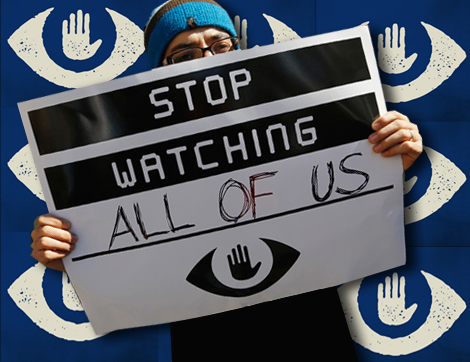
By Ronald L. Ray
Ongoing revelations of the incredible extent of United States government spying on hundreds of millions of Americans prove ever more clearly AMERICAN FREE PRESS’s longstanding contention that Orwellian laws passed after September 11, 2001, were never about making the “homeland” safer, but about destroying Americans’ constitutional freedoms. It is good news, however, that a growing number of citizens, and even politicians, are waking up to the already far-reaching tyranny of the government. In the short time since AFP reported on the Fourth Amendment Protection Act (4APA), proposed in the Arizona Legislature, the list of states seeking to curb surveillance without a search warrant has grown to 14 or more.
The 4APA is model legislation proposed by the OffNow Coalition. The bill would prevent state and local government units, as well as private companies, from providing support or services to the National Security Agency (NSA). It would also keep public universities from funding or recruiting for the NSA and make data it collected without a search warrant inadmissible in state courts.
Kansas and Missouri legislators have introduced more limited versions, while Washington, Utah and a few other states may also climb on board the effort, according to Michael Maharrey of the Tenth Amendment Center, speaking to National Journal.
The ruckus around the NSA also has states looking to rein in out-of-control police forces and prosecutors. Associated Press reported on February 5, 2014, about other efforts to protect citizens’ privacy, like a proposed Colorado limitation on keeping images from license plate readers, and Indiana, Delaware and Oregon efforts to restrict collection of information from cellular telephones and text messages. Texas has already passed a digital privacy bill.
Even Congress, in this election year, may make a paltry effort to check NSA snooping through the USA Freedom Act. The bill tries to curb some surveillance of Americans, while placing minor limitations on foreign espionage. And while it does not shut down the NSA, the legislation would end authority of the FISA Amendments Act in June 2015, rather than December 2017.
But the military-industrial-media-banking cabals are starting to push back. Establishment media reports seek to cast doubt on grassroots efforts to keep the federal government from spying on over 300 million Americans, implying that states do not have jurisdiction over what Washington does. This is a smokescreen, though, as even the 4APA restricts efforts to what happens within a state’s borders.
A few spokesmen for law enforcement agencies warn direly that restricting already unlimited surveillance activities will unduly hamper criminal investigations. The claims attempt to instill fear into citizens and are the expressions of those who do not want to surrender their massive power to terrorize the law-abiding populace.
A long article in The Nation on February 4, 2014, reveals further that federal snoops, not content with violating the fourth amendment, are also ignoring the sixth amendment by recording privileged attorney-client telephone conversations, when no suspicion exists of criminal collusion between the two parties. But a recent Supreme Court ruling makes it nearly impossible for citizens to challenge this unconstitutional eavesdropping. The federal government seems to believe that FISA laws render the fourth and sixth amendments moot.
For all of the NSA’s spying on nearly every American and most of the rest of the world, their despotic efforts have resulted in only one “successful” prosecution arising from use of collected telephone records—one which even the Federal Bureau of Investigation admits was not a “terrorist plot”—hardly a stellar success.
All AFP readers are urged to push their political representatives to limit tightly—and preferably end—the totalitarian espionage of the NSA and other government entities.
Ronald L. Ray is a freelance author and an assistant editor of THE BARNES REVIEW. He is a descendant of several patriots of the American War for Independence.


